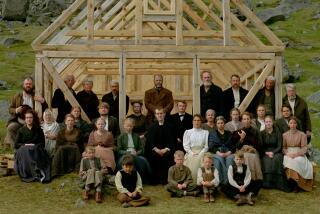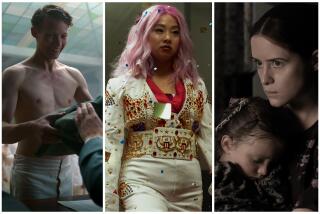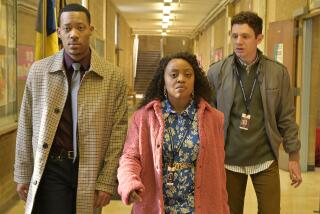A More Real, Regal Siam
- Share via
“Anna and the King” is stuffed with things: 19 costumed elephants, 500 gilded Buddhist statues, 4,000 square feet of marble polished with coconut oil and banana leaves, nearly 10 miles of Thai cloth used to dress the background players, not to mention the largest set built from scratch since “Cleopatra.” But what it doesn’t have is what viewers may miss most: songs.
Though the story of a love that dared not speak its name between widowed Victorian schoolteacher Anna Leonowens (Jodie Foster) and the autocratic King of Siam (Chow Yun-Fat) did not start life as a musical, it’s best known as the inspiration for Rodgers and Hammerstein’s “The King and I” and songs such as “I Whistle a Happy Tune,” “Hello, Young Lovers,” “Getting to Know You” and “Shall We Dance?”
Harking back to the story’s cinematic roots (it was filmed straight in 1946 as “Anna and the King of Siam”), this “Anna and the King” has designs on being taken seriously as a drama. Which is why Chow’s King Mongkut has to contend with things like death squads and corpses hanging from trees that would’ve defoliated Yul Brynner’s head if it wasn’t already bald.
More flat and disappointing in a wasted opportunity kind of way than anything truly bad, the problem with “Anna and the King” is that it’s caught halfway between then and now. As written by Steve Meerson & Peter Krikes and directed by Andy Tennant (who did the similarly well-intentioned but vapid “Ever After”), the film tries to throw in notions of cultural relativism and big power imperialism, but can’t do without corny shtick like a monkey stealing the king’s spectacles and Anna’s young son asking, “Mother, what’s a concubine?” Alternating ancient jokes about elephants’ rear ends with battles and explosions may seem like a path to a film for everybody, but what it really leads to is a film for nobody in particular.
What can’t be second-guessed about “Anna and the King” is its ravishing look, the work of top-drawer talent like production designer Luciana Arrighi (“Howards End,” “Remains of the Day”) and costume designer Jenny Beavan (“A Room With a View,” “Sense and Sensibility”), all expertly photographed by Caleb Deschanel (“The Black Stallion,” “Fly Away Home”). The physical re-creation of 1862 Bangkok and the king’s genuinely palatial palace compound is so appealing that we often wish we could abandon the film and wander around the compound on our own.
While having the gifted Foster as your star is usually a bonus, her effectiveness is hampered here by wrongheaded character development that results in the actress being too unlikable for too long. When Anna and her son arrive in Siam to tutor the children of the king, especially his eldest son and heir to the throne Prince Chowfa (Lim Kay Siu), in the English language, science and literature, she is an unregenerate chauvinist and testy know-it-all who believes “the ways of England are the ways of the world.”
While this point of view is creditable and initially necessary for the film to develop its predictable “she learns from the East, the East learns from her” theme, problems develop because Foster embraces this attitude too intensely and for too long.
Headstrong to the point of foolhardiness, a busybody who is either pursing her lips or speaking through clenched teeth when she’s not doing both, Anna is so singularly lacking in charm that the king, not the most easygoing of fellows, is moved to comment on her “irritatingly superior attitude.” Your husband, he tells her at another point, “must have been very understanding.”
Of course, the king, being a king, is mostly bemused by Anna’s insolence and actually takes pleasure in her forthrightness and spunk. Audiences may be less understanding, and though Anna eventually loosens up a bit, the film has pretty much lost us by that point.
Though he looks regal enough, Chow (still best known to Western audiences for his Hong Kong John Woo films despite U.S. ventures like “The Corruptor” and “The Replacement Killers”) does not strike notable sparks with Foster, not even in the waltz they share together in an elaborate banquet scene that tries with only halfhearted success to be the film’s emotional centerpiece.
Maybe that’s because in “Anna and the King” the king has a whole lot to worry about besides a tutor who stomps around as if she owned the palace. There’s his lovely new concubine Tuptim (Bai Ling), who’s pining for the guy she left behind outside the palace. And then there are those pesky corpses up north. Are the British behind the outrage, the French, someone else? If only His Majesty could be taught to whistle a happy tune, he’d probably feel a whole lot better about everything. Even Anna.
* MPAA rating: PG-13 for some intense violent sequences. Times guidelines: an intense caning and shots of corpses hanging from trees.
‘Anna and the King’
Jodie Foster: Anna
Chow Yun-Fat: King Mongkut
Bai Ling: Tuptim
Tom Felton: Louis
Syed Alwi: The Kralahome
Randall Duk Kim: Gen. Alak
Fox 2000 Pictures presents a Lawrence Bender production, released by 20th Century Fox. Director Andy Tennant. Producers Lawrence Bender, Ed Elbert. Executive producer Terence Chang. Screenplay Steve Meerson & Peter Krikes. Cinematographer Caleb Deschanel. Editor Roger Bondelli. Costumes Jenny Beavan. Music George Fenton. Production design Luciana Arrighi. Art directors Paul Ghirardani, “Lek” Chaiyan Chunsuttiwat. Set decorator Ian Whittaker. Running time: 2 hours, 28 minutes.
More to Read
Only good movies
Get the Indie Focus newsletter, Mark Olsen's weekly guide to the world of cinema.
You may occasionally receive promotional content from the Los Angeles Times.











